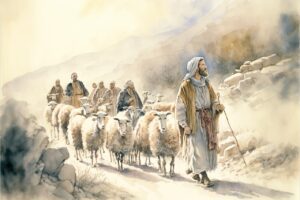Encouragement for Elders
 When Jesus restored Peter after his denial, the Lord told him to, “Feed my lambs…tend my sheep…feed my sheep.” Maybe Peter was thinking of that moment as he began to finish up his first letter. He gives important instructions to the elders who served churches scattered throughout the Roman Empire in the first century.
When Jesus restored Peter after his denial, the Lord told him to, “Feed my lambs…tend my sheep…feed my sheep.” Maybe Peter was thinking of that moment as he began to finish up his first letter. He gives important instructions to the elders who served churches scattered throughout the Roman Empire in the first century.
First, he tells them they serve by taking care of the ones whom God has given them. Peter said, “shepherd the flock that is among you.” Like any honest shepherd, elders don’t go out and try to rustle sheep from other pastures. They tend to the sheep God sends to their flock. This is an argument for church membership, which requires a decision and a commitment by a person or family to put themselves under the leadership of the elders in a local church. It is also an argument for participation in smaller life groups in the church. Elders cannot as easily exercise oversight with a moving target or a missing member. It is good for the members to be in close fellowship with small groups every week, and it is good for the elders to have that close-up ministry with them.
Second, he says that elders should serve willingly, not under compulsion, not for shameful gain, but eagerly. Elders do not serve because someone, their wives, or their best friend, told them they should be an elder. Nor do they serve for money, even if one or more of them are paid. They serve willingly, even eagerly, as God would have them do. This seems hard for us to understand because we are not being persecuted as believers with execution or even imprisonment. But being set apart in Peter’s day as an elder, and today in places where conversion to Christ is illegal or where baptism can bring a death sentence, brings a whole different set of challenges. But even here, where we are relatively safe, any sincere shepherd of Christ’s flock will feel the weight of that responsibility. And he leans into it eagerly.
Third, he writes that elders are to serve not by domineering over the flock but as examples to the flock. Edmund Clowney writes, “Elder-shepherds are not cowboys, driving their flocks like cattle. They lead them as a shepherd would, walking on ahead.” Elders must be men who, and we who are elders should tremble at this, can say as Paul did, “Be imitators of me, as I am of Christ.” We are examples that can be seen, not just read about in Christian history books. And notice Peter again says the elders are to take care of those “in (their) charge.” The word used there was “lot,” with the reference being a practice of the Jews and the Romans to determine choice. The lots (could have been stones or some other object) of different parties were marked with their emblem and all were put into a vessel. It was shaken violently and then turned upside down. The “lot” that came out first indicated the man or party chosen for the occasion. What Peter seems to say here is that elders cannot choose their flock. God chooses their flock for them and their job is to tend to and feed the ones he gives. It is sad that the model we most often see in the U.S. are churches led by a solo pastor without elders who choose to reject his lot after two or three years and move to one he thinks he will like better. Some, perhaps, are looking for their reward here on earth, but that’s not where the greatest reward comes. Peter reminds us why we serve when he writes, “And when the Chief Shepherd appears, you will receive the unfading crown of glory.”
We serve because Jesus is coming back and will reward those who have faithfully served the church he purchased with his own blood. The crown of glory is great but we will cast it at his feet, the feet of the one who wore the crown of thrones for us. Most glorious will simply be to hear our Lord say, “Well done, good and faithful servant.”
